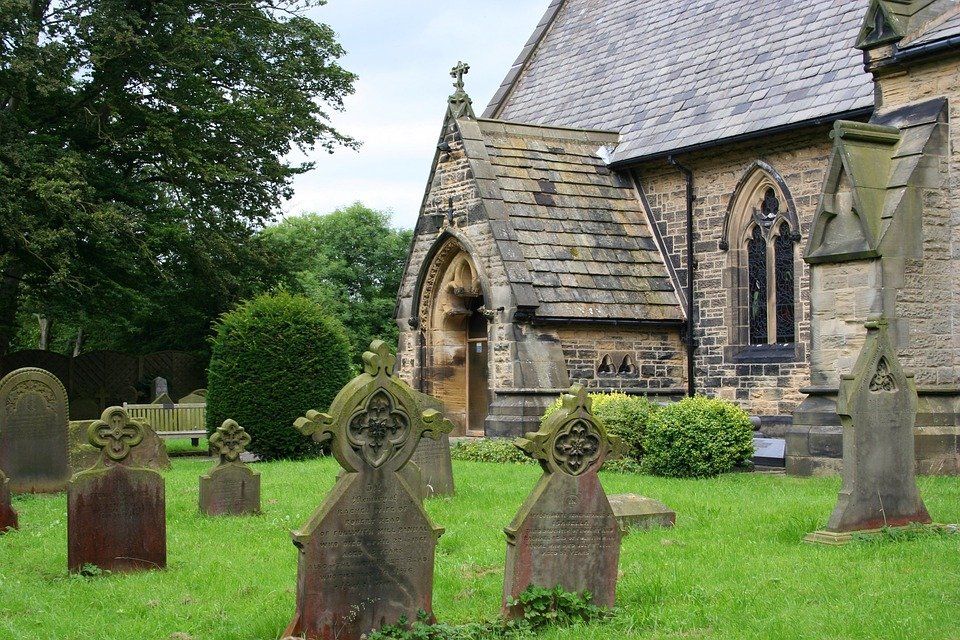The day before Good Friday six-year-old Dafydd Elwyn Davies was walking with his mother Rhiain on the banks of the river Towy near Carmarthen when he fell in and was drowned. He was partly named after his grandfather, the former secretary of the Evangelical Movement of Wales. Dafydd’s family are members of the Welsh Evangelical Church in Carmarthen. Their pastor, Dafydd Morris, took the funeral service a week later, preaching to a packed chapel on the text, ‘Underneath are the everlasting arms.’
The following is a sermon of Joel Nederhood on such grievous providences.
‘If only I had died instead of you – O Absalom, my son, my son!’ (2 Samuel 18:33).
Children die, and the trouble is that when they do, nothing helps. Everything about their deaths is wrong. We expect older people to die, but not children. Sometimes the death of older people is even appropriate – they have lived a full life , have accomplished much, and now it’s time for them to go. Sometimes the death of older people is merciful – their last days can be pain-racked, and the loving human beings we have known can become totally destroyed by a disease from which they can never recover. But with children it’s usually not that way.
Even when children are struck by a painful and serious illness, we hope for their recovery, for children are still growing, and we expect that their developing bodies will yet overcome the illness that is ravaging them. Yet, the dreadful fact is that children do die.
So when the dreadful happens, what can you do? Where can you turn? When trouble comes, some people take a drink … and another and another. But parents who have lost a child know that no matter how many drinks they may have, the emptiness will still be there once their heads clear. You can also try to escape by turning up the music, sitting back, and losing yourself in reverie. But when your child has died, no music can quiet your mind.
Nor can words take the pain away. In difficult situations we usually resort to using some combination of words to soothe people who are hurting. But the emptiness and pain caused by a child’s dying just stay there, no matter what anyone says. To those who grieve their child’s death the world seems unhinged, out of kilter, crazy, mixed up. Parents generally expect that their children will bury them, not the other way around. When they must bury their child, parents realize how much their expectations and plans for their child – at times precise, sometimes vague – have become a part of their consciousness. But now these parental expectations must be discarded, buried along with the child.

So a husband and wife, having told me about the death of their son, stand next to each other – silent, still, smitten. Although no tears are visible, these parents’ very demeanor is like a giant tear, for their sadness has taken possession of them. Their heartfelt sorrow surrounds them almost like a field of grief extending from them.
Their son is gone. Once again they think dully about the accident and wonder whether their son would have died if things had been only a little different that fatal evening. They remember the phone call; they remember their terror in the hospital emergency room; they remember how stunned they were when the doctor came with the news they dreaded.
They represent thousands of others. Perhaps you are one of those many parents yourself. If so, what about your child? Did he or she dart in front of a car? Was it a cot death? Or some terminal disease? Was it a moment of foolishness that turned into a moment of terror? A physical problem that your child was born with? Suicide? Whatever it was, I know your heart is broken.
The Bible records the anguish of David, the King of Israel, when his son Absalom died. Absalom was not a good son, and he was ruthlessly killed after he had rebelled against God and against his father. Apart from all that, I am interested in the way David reacted to his son’s death. In David we see the reaction of all parents to the death of a beloved child. David obviously loved Absalom. Hearing the news of Absalom’s death, he cried, ‘O my son Absalom! My son, my son Absalom! If only I had died instead of you – O Absalom, my son, my son!’.
‘If only I had died instead of you’ – is this the way you sometimes feel when you think about your child who is no longer with you? May I say something that might help you now as you grieve? Human words don’t help much, I know, but there are other words, which I will try to use. Thank God, there are other words! And these words greatly help and comfort people who live by faith. They believe in Jesus Christ and the message of the Bible.
May I start by saying that I pray that you have faith? I realize that the death of a child makes faith almost impossible for some people. How can God let such a terrible thing happen? As parents turn away from the grave of their child, they sometimes feel this question push its way between their clenched teeth. Yet people who have faith in Jesus Christ can be helped by the words of God when their children die. In a little while I want to come back to this matter of having faith in Jesus Christ. You see, the very grief that now makes you so bitter could very possibly bring you closer to Jesus. Those who believe in Jesus and who believe the Bible can slowly but surely work through their profound grief. Here are some truths from the Bible that may help you.
You must remember that your child, even though young, could, like every other human being, die at any time. Consider this statement in Isaiah 40 about physical life: ‘All men are like grass, and all their glory is like the flowers of the field …. The grass withers and the flowers fall, but the word of our God stands forever’ (w. 6-8). Psalm 103 makes the same point: ‘As for man, his days are like grass, he flourishes like a flower of the field; the wind blows over it and it is gone, and its place remembers it no more’ (w. 15-16).
You know, one of the reasons that parents can be so shocked and devastated by the death of children is that we mistakenly assume children to be almost indestructible. They are young and strong. If sick, they’ll get well – so we think But we must remind ourselves that all human flesh is like grass: yours, mine, and that of babies, children and teenagers too. We are here today and gone tomorrow. Death stalks us from the moment we are born.

So what we need is a little more realism about ourselves and our children. Our children, with us, are mortal, and we, together with them, can die or be killed. This biblical truth about our being like grass is not very pleasant, but we must keep it in mind.
The next idea I want to discuss is more positive: if you have lost a son or daughter, remember that your child’s earthly life was complete when he or she died. Think about this: nothing happens by chance; God is in control of all events; and your child’s life and death were not an accident. Regardless of how long your child lived – five days or fifteen months or twenty-five years – you can be assured that your child’s life was just as full and complete as yours will be the day you finally die.
It is easy to think about God’s control over all things in connection with birth. On your birthday you feel instinctively that God determined the day on which you would be born. But God determines our death day as well as our birthday. Neither of these days is an accident, even though we ourselves cannot determine other one.
In Psalm 139 David muses on the mysterious path of life from the womb to the grave. As you read these verses, think about your child who has died: ‘My frame was not hidden from you when I was made in the secret place. When I was woven together in the depths of the earth, your eyes saw my unformed body. All the days ordained for me were written in your book before one of them came to be’ (w. 15-16).
According to Psalm 139, all the days of our lives are ordained, or determined. Remember, this is true of everybody, including the child who, from a human point of view, died an untimely death. But we must try to rise above the human point of view. God has given us his book, the Bible, so that we can look at the events of our early lives from a heavenly perspective.
Some parents who have lost children have told me about how their children have made an impact on other people. I think of a young girl who left a powerful message behind when she died at the age of fifteen. I think of a young male high school graduate, killed in a tragic accident, who left a lasting impression on his former classmates. I remember a nineteen-year-old worker in our organization who, killed in an airplane accident, left a legacy of dedication to Jesus and his work. And I know of little children who have left a special mark on this world before they went the way of all flesh.
We cannot understand why some people live such a short time. The flower of their life grows up for just an instant before it is swept away – and we are aghast. But, remember, your child who died lived a complete life. God ordains both the day of our birth and the day of our death according to his wisdom and love.
God, the Father of our Lord Jesus Christ, knows that every one of us is doomed to die, and he knows how utterly devastated and stricken people like us feel when our children die before we do. When you turn to this understanding God, he will comfort you, and over the years he will enable you to bear the heavy grief that is now breaking your heart.
I want to conclude with some words from Romans 8: ‘We know that in all things God works for the good of those who love him, who have been called according to his purpose … If God is for us, who can be against us? He who did not spare his own Son, but gave him up for us all – how will he not also, along with him, graciously give us all things?’ (Romans 8: 28,31-32).





